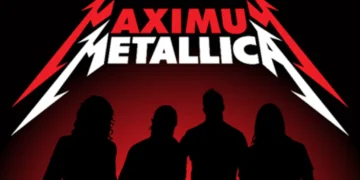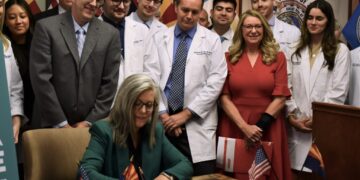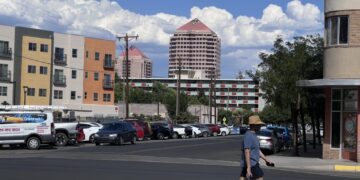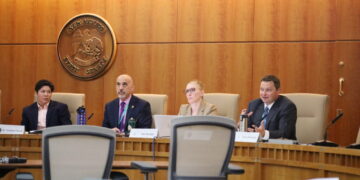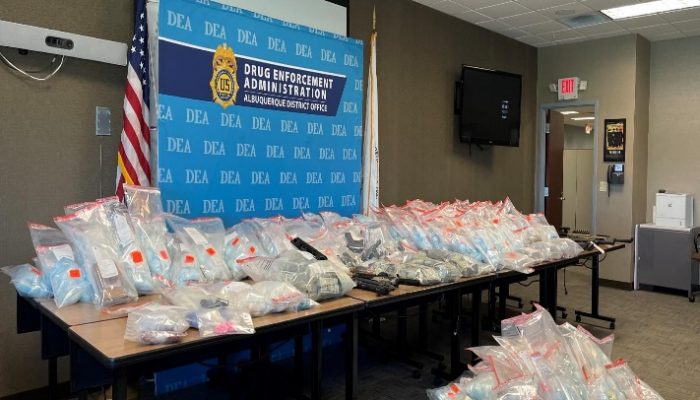The U.S. Department of Justice said cash and drugs, pictured here, were seized in Santa Fe and Albuquerque New Mexico in the country’s largest ever fentanyl bust in April, 2025 (Courtesy U.S. District Attorney’s Office, District of New Mexico)
The U.S. government on Tuesday announced drug trafficking and conspiracy charges against 17 people — at least six in New Mexico — in what U.S. Attorney General Pamela Bondi is calling the “largest fentanyl bust in our nation’s history.”
At a news conference in Washington D.C., U.S. Attorney for the District of New Mexico Ryan Ellison said prosecutors have filed conspiracy, illicit fentanyl distribution, firearms and immigration charges as a result of the bust.
He also said the alleged drug trafficking organization is “one of the largest and most dangerous fentanyl operations in United States history” — spanning New Mexico, Arizona, Nevada and Utah — and distributes drugs “throughout the western United States.”
“We will not tolerate those who profit from poisoning American citizens,” Ellison said.
Bondi said the organization is affiliated with the Sinaloa Cartel operating out of Mexico, and when authorities arrested its alleged leader, Heriberto Salazar Amaya, they found millions of dollars in cash and vehicles. She said he “insulated himself” from the drugs, which agents found in Albuquerque, Phoenix and Utah.
Asked for specifics on how the defendants were captured, Bondi said the investigation is ongoing and she won’t reveal police sources or methods.
In court records, two Drug Enforcement Administration special agents characterized three New Mexico defendants David Anesi, Vincent Montoya and Francisco Garcia as “high-volume drug traffickers” in the Albuquerque area, and Phillip Lovato as a “significant customer” in Santa Fe.

They also named Roberta Herrera as Montoya’s significant other “who has been observed participating in drug transactions” with him, and allege that Misael Lopez-Rubio rented out a storage unit in Albuquerque to use as a stash location.
DEA Acting Administrator Robert Murphy noted that the organization’s drug distribution had “probably caused” someone to die.
Since 2018, New Mexico has experienced a dramatic increase in drug overdose deaths associated with prescription drug use and, more recently, use of illicit fentanyl, according to the state Department of Health. Overall, deaths in the state attributed to drug overdose have fallen in the last two years.
Overall, authorities seized 11.5 kilograms of fentanyl powder; approximately $4.4 million in cash; approximately 79 pounds of methamphetamine; approximately 7.5 kilograms of cocaine; approximately 4.5 kilograms of heroin; approximately 41 firearms; and approximately 4.1 million fentanyl pills, according to court records.
Ellison said in Albuquerque alone, police found 2.7 million fentanyl pills; 11.5 kilograms of “concentrated fentanyl powder;” seven pounds of methamphetamine; “multiple kilograms of heroin and cocaine;” 41 firearms; more than $600,000 in cash and “numerous luxury vehicles.”
“When we catch you — all of these individuals, if convicted, we will put you behind bars,” Bondi said. “There will be no negotiating, and we will lock you up for as long as humanly possible. We will not negotiate with those who are killing our family members including brothers, sisters, daughters, sons, parents, friends.”
DOJ prosecuting, not deporting, defendants who aren’t citizens
Bondi said six of the people charged are living in the U.S. unlawfully. A detention order for Lopez-Rubio indicates that he will be held until trial, in part, because he lacks legal status in the U.S. and is subject to removal or deportation after any prison sentence.
When asked how she’s deciding whether to prosecute or deport any defendants who lack U.S. citizenship, Bondi said it’s based on their potential prison sentences, if they’re convicted.
“I want them to stay in our prisons as long as possible,” Bondi said. “There’s a very big risk — we all know — releasing someone, especially to Mexico. Sending them back to Mexico, who knows, they could attempt to get through our borders. Not under Donald Trump, I doubt. But they’re also part of a major drug trafficking ring in Mexico, so sending them back to Mexico to continue on with their drug business isn’t going to happen under this administration.”
GET THE MORNING HEADLINES.
This post was originally authored and published by Austin Fisher from via RSS Feed. to get your news feed on Nationwide Report®.

